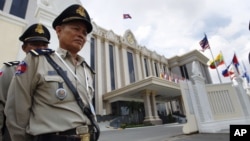PHNOM PENH —
An ASEAN foreign minister says key players in the South China Sea dispute must keep official lines of communication open, even if a long-awaited agreement on how to settle the maritime quarrel remains elusive.
Indonesian Foreign Minister Marty Natalegawa is proposing that the Association of Southeast Asian Nations and China open a communication "hotline" to cool off any further confrontations in disputed areas of the South China Sea.
He says this safety mechanism should be put in place even if ASEAN and China, which claims a broad section of the sea, remain far off in agreeing on a long-delayed Code of Conduct (COC) on how to handle competing claims.
"What Indonesia is now looking for while we are working on the COC is a commitment on the part of ASEAN and China to open a hotline of communication so if there were to be an incident in the future, irrespective of the fact that the COC is not yet in operation, we can commit to have communication and have dialogue if there were to be disputes," said Natalegawa.
The proposal is another indication of what observers have widely expected: China and ASEAN remain far apart on achieving any consensus on how to end the dispute.
Four ASEAN member - the Philippines, Malaysia, Brunei and Vietnam - claim parts of the South China Sea. But it is China's extensive claim across much of the waterway that has proven to be a flashpoint with ASEAN. The four ASEAN members have pushed to have China settle the dispute with the bloc as a whole, but it is believed that China prefers to resolve claims with individual countries.
Natalegawa says that even if a code of conduct is out of reach in the coming days, some progress must be made during leaders' meetings scheduled to begin Sunday.
"I think the key word here is momentum," Natalegawa added. "Indonesia is keen to ensure we not lapse. If we were to stand still there could be regression."
For now, ASEAN does appear to be moving forward on another file: a region-wide declaration on human rights. Leaders are set to sign off on the document Sunday. But human rights groups say the declaration does not meet international standards and they have criticized the secrecy of its drafting process.
Critics, including United Nations rights watchdogs, are particularly alarmed by references in previous drafts that rights could be subject to "national and regional contexts" and differing "cultural and religious backgrounds."
"Regional context is not cast in stone," said Natalegawa as he downplayed rights concerns. "It is evolving. Imagine the national context in Myanmar two years ago. It's very different to the national context today. So when we mention the words regional context, it is simply describing a reality that the human rights declaration must be implemented in the country concerned. It's not like an attempt to dilute the commitment, because the region keeps on changing and is very dynamic. "
ASEAN heads of state begin face-to-face meetings Sunday. U.S. President Barack Obama is scheduled to arrive late Monday.
Indonesian Foreign Minister Marty Natalegawa is proposing that the Association of Southeast Asian Nations and China open a communication "hotline" to cool off any further confrontations in disputed areas of the South China Sea.
He says this safety mechanism should be put in place even if ASEAN and China, which claims a broad section of the sea, remain far off in agreeing on a long-delayed Code of Conduct (COC) on how to handle competing claims.
"What Indonesia is now looking for while we are working on the COC is a commitment on the part of ASEAN and China to open a hotline of communication so if there were to be an incident in the future, irrespective of the fact that the COC is not yet in operation, we can commit to have communication and have dialogue if there were to be disputes," said Natalegawa.
The proposal is another indication of what observers have widely expected: China and ASEAN remain far apart on achieving any consensus on how to end the dispute.
Four ASEAN member - the Philippines, Malaysia, Brunei and Vietnam - claim parts of the South China Sea. But it is China's extensive claim across much of the waterway that has proven to be a flashpoint with ASEAN. The four ASEAN members have pushed to have China settle the dispute with the bloc as a whole, but it is believed that China prefers to resolve claims with individual countries.
Natalegawa says that even if a code of conduct is out of reach in the coming days, some progress must be made during leaders' meetings scheduled to begin Sunday.
"I think the key word here is momentum," Natalegawa added. "Indonesia is keen to ensure we not lapse. If we were to stand still there could be regression."
For now, ASEAN does appear to be moving forward on another file: a region-wide declaration on human rights. Leaders are set to sign off on the document Sunday. But human rights groups say the declaration does not meet international standards and they have criticized the secrecy of its drafting process.
Critics, including United Nations rights watchdogs, are particularly alarmed by references in previous drafts that rights could be subject to "national and regional contexts" and differing "cultural and religious backgrounds."
"Regional context is not cast in stone," said Natalegawa as he downplayed rights concerns. "It is evolving. Imagine the national context in Myanmar two years ago. It's very different to the national context today. So when we mention the words regional context, it is simply describing a reality that the human rights declaration must be implemented in the country concerned. It's not like an attempt to dilute the commitment, because the region keeps on changing and is very dynamic. "
ASEAN heads of state begin face-to-face meetings Sunday. U.S. President Barack Obama is scheduled to arrive late Monday.




